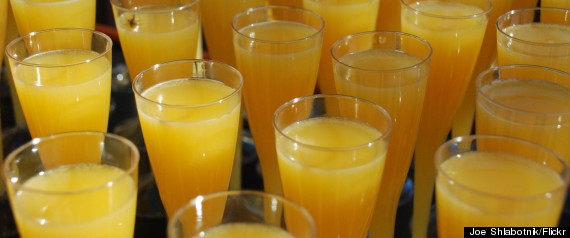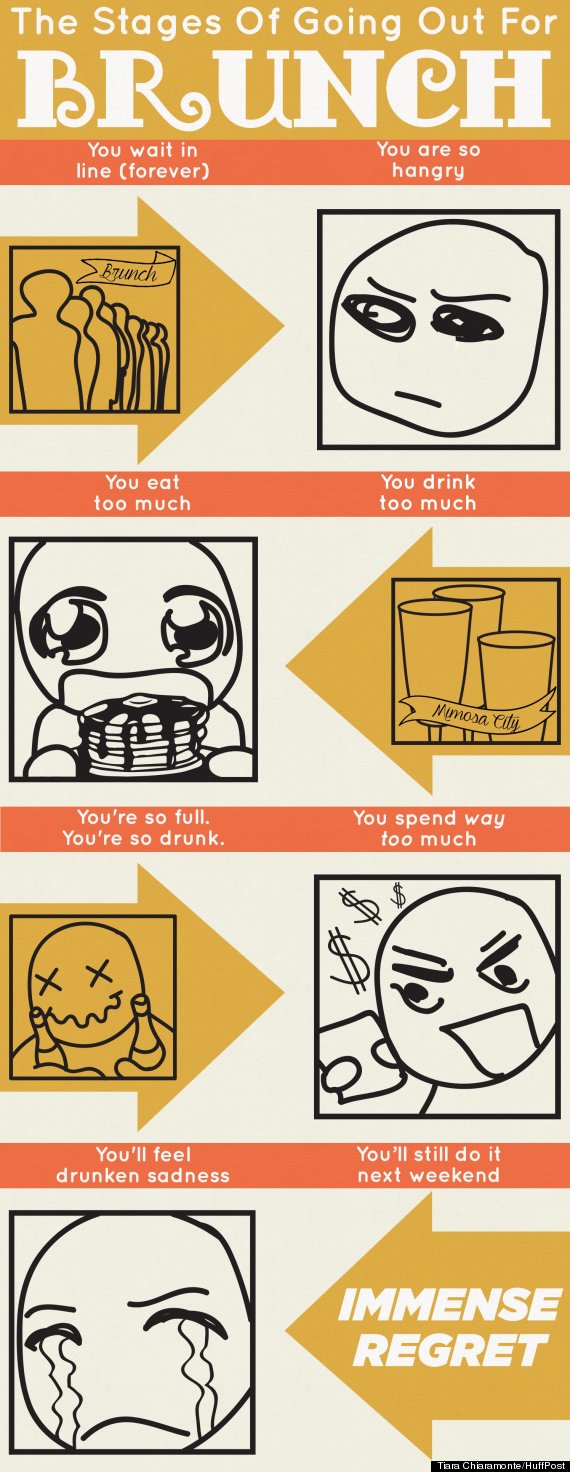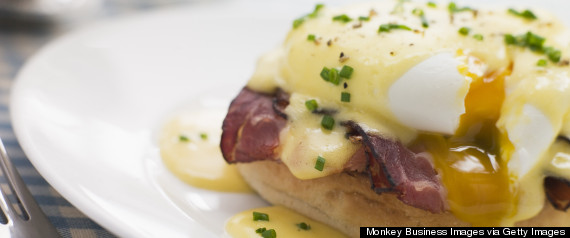
Brunch is a beloved eating event treasured by the hungry and the hungover. For many, this portmanteau of two meals serves as a weekend social occasion to catch up with friends, get a little buzzed and soak up the previous night's bad decisions.
But in truth, brunch in itself is a bad decision. It kind of sucks. It's appallingly expensive, and excessive brunching is almost definitely bad for your health. Today, in HuffPost Debbie Downers, we're going to explain why going to brunch is such a terrible choice.
First and foremost, there's the line...
Chances are, when you want brunch, so does everyone else in your city. You've likely experienced it before: You intend to dine around 11:30 a.m., but you aren't seated until noon. Besides the hunger factor -- which is a big one -- waiting in line is a stressful activity that may even be taking a toll on your health. Research shows it can be a catalyst for increased heart rate and blood pressure.
When a noon brunch is your first meal of the day, you suffer.
Brunch, inherent in its name, is the combination of breakfast and lunch. The melding of the two mealtimes allows for menu items that would break the rules if they were strictly reserved for breakfast or lunch individually. And that is fun.
But the rule-breaking gets dangerous when you omit breakfast from your morning for the sake of "saving room." Experts beyond your mother will argue that you're missing out on the immense health benefits of breakfast (at a normal hour).
Breakfast eaters win big: They’re more likely to have better blood sugar and cholesterol levels, feel more alert throughout the day and have a boosted short-term memory than those who skip the morning meal. Research has found an association between skipping breakfast and heart issues like coronary disease and heart attacks. And, according to another study, those who neglect breakfast are more likely to be obese.
It doesn't end there. Without food first thing to get you going, you can expect hanger: The headaches, mood swings and fatigue that come along with low blood sugar.
Drinks are way overpriced.
Bars and restaurants can mark up alcohol by sometimes more than 500 percent, and wine often has especially high markups. And what popular brunch drink contains wine? Mimosas, made with sparkling wine (or Champagne, if it's from France) and OJ. A basic mimosa can cost $12 at some fancy New York City brunch spots. By spending $20 on a bottle of sparkling wine, you could make very respectable mimosas at home for just $3.50 a glass.
 Would you like a mimosa? Or how about a mimosa?
Would you like a mimosa? Or how about a mimosa?
But what about bottomless brunch?
"All you can drink" brunch discounts may seem like a good deal, but restaurants can have ulterior motives. Often, bottomless brunch specials are what economists call "loss leaders," designed to hook customers so they keep coming back and spend more later at the same eatery. Restaurants will cut you off if you get too drunk or when time's up. And there seems to be some confusion over whether limitless drinks are even legal.
Also, some restaurants water down these unlimited adult beverages, meaning you need to drink a ton to get a buzz. Which leads us to our next point...
That boozy bonanza will lead you to consume more liquid calories than you probably planned for.
No, there's nothing wrong with a drink at brunch. But with the opportunity to go bottomless, you'll be more inclined to throw them back. After all, while you think you're getting a bang for your buck, you're subjecting yourself to the painful consequences of binge drinking and consuming a ton of calories.
Let's break it down for brunch: A classic bloody mary contains around 170 calories. A refreshing mimosa will clock in around 100 cals and a sangria (with all the fruity works) contains a bit more than 250 calories. In a single serving, none of these stats are terribly alarming. But at a bottomless brunch, where the booze flows like well, wine, it's difficult to have control over how much you're consuming.
In this case, two sangrias will set you back 500 calories, but you won't be able to fully recognize how much you're guzzling if the drink's served in a pitcher. And when the buzz hits, you'll be more likely to fill yourself with additional calories. "Alcohol lowers your inhibitions," Rebecca Scritchfield, a registered dietitian, told The Huffington Post in an email. And this "can hinder you from realizing how full or satisfied you are." "Bring on the bloodies," you'll slur.
Here's the vicious cycle that is weekend brunch (story continues after the graphic):
Typical brunch fare doesn't tend to be "healthy."
Indulging in a decadent brunch on occasion -- even licking the plate clean -- isn't really a gut buster. "Get what you want and eat until you are full," Scritchfield said. "If all you really want is that pancake, then go for it." But when brunch becomes a ritual, and lowered inhibitions become a regular guest of that party, calories add up (and as a result, so do the pounds). A few facts that might make you momentarily put down your fork:
A single ounce of bacon contains 30 milligrams of cholesterol. (A full 68 percent of bacon's calories come from fat -- and half of that fat is the saturated kind.) Diets high in cholesterol are associated with increased risk of heart disease and stroke. Bacon is also salty: Just four to five slices of the stuff will bring you up to half of your daily recommended sodium intake. Like cholesterol, high-salt diets have been linked with high blood pressure and heart disease.
Mmm, the smell of that sticky syrup that dressed up your pancakes lingers all day long (probably because you got some in your hair). So too do the health effects of all that sweet stuff. Just a single tablespoon of maple syrup -- probably not enough to properly fill each waffle cranny -- contains 14 grams of sugar. The World Health Organization recommends limiting your intake to 25 grams a day. Consuming too much added sugar is linked with many not-so-sweet health risks, like high cholesterol, type 2 diabetes and heart disease.
And the food's overpriced, too.
It's no surprise that food at restaurants is going to be more expensive than it is at home, but brunch may be especially prone to rip-offs. For one, brunch spots -- particularly those offering a buffet -- tend to create dishes using whatever ingredients are left over from the week prior. And certain brunch-specific items, like pancakes and eggs, can be especially overpriced in restaurants.
The average price of an egg for consumers is just $0.17, according to the Bureau of Labor Statistics. Compare that to $2, $3 and even $6 for the price of an egg side dish at some popular brunch places across the U.S.
 Wait, I paid how much for this?
Wait, I paid how much for this?
In fact, discount deals often make you feel worse.
Bottomless or all-you-can eat brunches can have the doubly negative effect of causing brunchers to eat more and enjoy it less, according to a study by Cornell economists David Just and Brian Wansink. The study found customers typically try to recoup the cost of flat-rate meals by eating more, despite the fact that doing so made them enjoy the food less.
It's also bad for servers.
Even though servers have to get up early on the weekend to work brunch shifts, there's anecdotal evidence that they get less in tips. Also, studies have found that servers get more tips when they have more opportunity to interact with customers, something that can be hard to do at brunch buffets or in really busy restaurants.
Your productivity plummets afterward.
Your weekend plans to exercise, tidy up or just decompress from a stressful workweek may all be distorted by a boozy brunch. As Scritchfield reminds us, alcohol is a depressant. It makes you feel sluggish, sleepy and sad. Translation: You'll be less likely to follow through with other plans. Even if your plans were just to bum around for two days (no judgement), you'll just feel, well, icky.
Plus, if you decided to brunch on Sunday, your Monday will be -- you know this -- a headache. It's much tougher to get anything done when you're tired, dehydrated, experiencing nausea and hating life a little. Murray likens the Monday after a Sunday day-drinking event to going a night without quality sleep. Your focus, memory and concentration may be impaired, and these have deeper consequences when you're off your couch and in a professional setting.
Bottom line here folks? Going out for brunch sucks. If you miss your eggs Benedict and/or flapjacks so desperately, why not make 'em at home?
